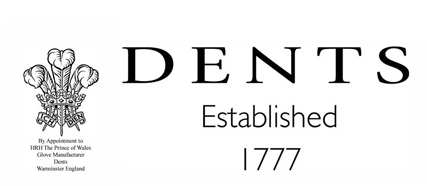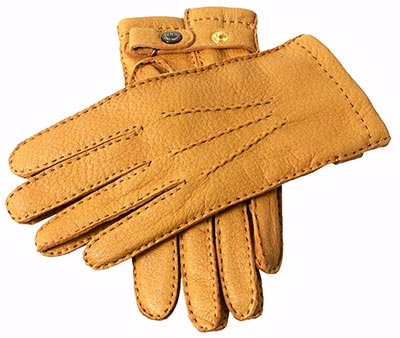
by Lynn Ascrizzi
When it comes to the making of fine leather gloves, you’d be hard-pressed to find a glover with the preeminence and royal panache that is Dents. Dents has maintained its royal cachet and ‘absolutely top-end’ credo, for 240 years
This small, luxury goods business, founded in 1777 by John Dent in Worcester, England, is quite possibly Britain’s oldest fashion manufacturer, a company meticulously crafting gloves of distinction since the days of that beleaguered monarch, King George III, who reigned during the American Revolution.
Today, Dents is a subsidiary of Dewhurst Dent, PLC, owned by Robert Yentrob since the mid-1960s. The company manufactures leather gloves and designs other accessories, such as leather handbags and wallets, classic hats and finely woven wool scarves.
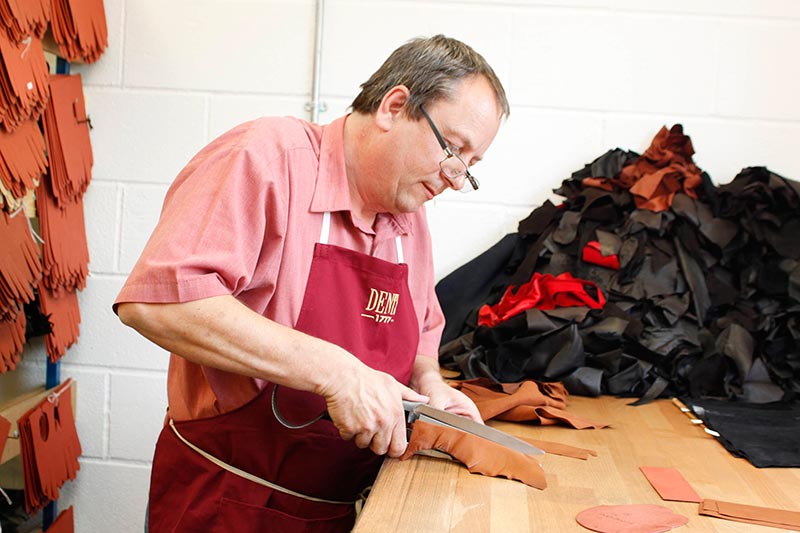
“We still have a factory here and still produce gloves — table cut — the old way,” said company chief executive Deborah Moore, who has been with Dents for 27 years. “Each glove is cut out separately and handsewn. It’s the craftsmanship, the love we put into making them. It’s tangible,” she said. Their heritage line, made exactly the same way today as 100 years ago, also includes machine-sewn gloves.
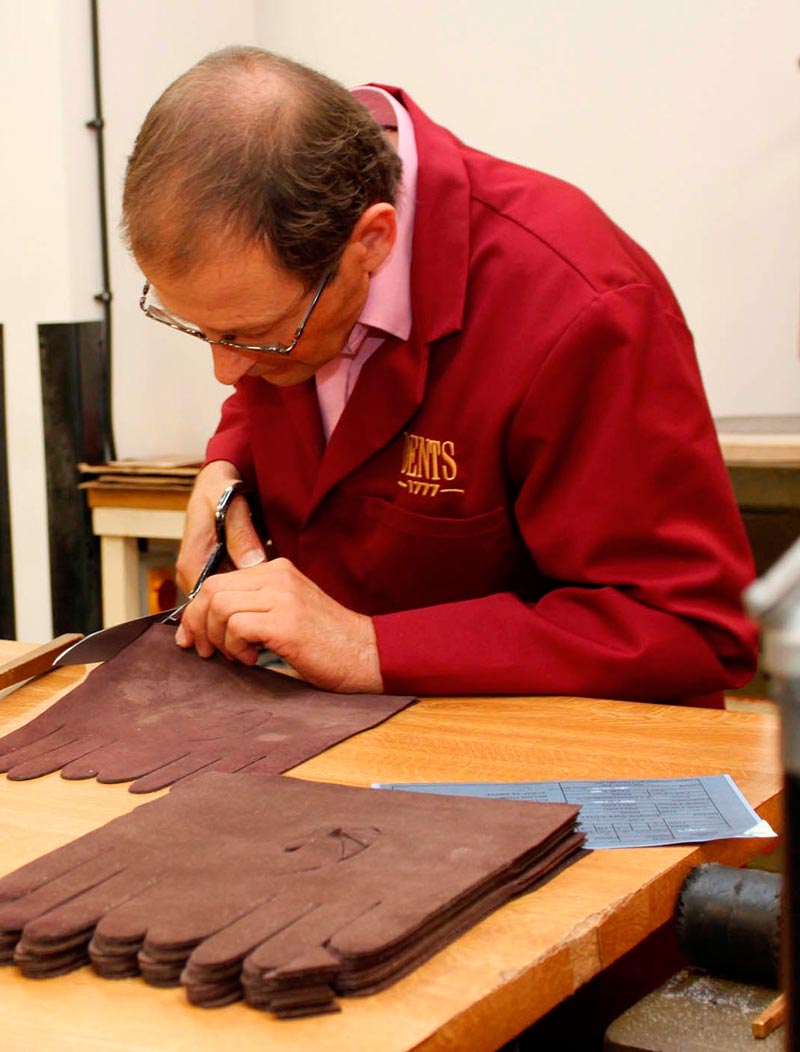
Moore pulls no punches when she describes Dents’ stature in the world of high style: “We’re absolutely top-end,” she said.
Their premier gloves, made of fine hairsheep, deerskin and peccary leathers, are cut and sewn in their UK factory in Warminster. The line is displayed under “The Heritage Collection,” at www.dents.co.uk.
Machine-sewn gloves not part of this collection are made in a factory in the Czech Republic. “Those gloves are made exactly the same as ours, here (in the UK), but they’re less expensive. We’ve worked with this factory for over 40 years. We send quality controllers to inspect production, at every stage. I also go myself,” Moore said.
Whether used for evening or daywear, all Dents gloves are made with tremendous attention to detail. The rule of thumb is, the more handcrafting involved, the more expensive the gloves.
Machine stitching, like Dents’ other crafting methods, is characteristically unique. Workers use vintage Singer sewing machines that stitch vertically and horizontally, so gloves can be turned in whatever direction is needed. The antique machines can no longer be bought, so Dents has in-house specialists who refurbish and repair them.
“You can easily tell the heritage from the machine-sewn gloves, by the prices,” she explained. “Dents gloves retail from $100 for machine-stitched, wool-lined gloves, to $400 for a peccary leather, handsewn glove. The men’s classic, hand-sewn, hairsheep leather and cashmere-lined glove retails for about $250.” In short, Dents gloves are not something that you’d want to leave behind, say, on the Orient Express.
Their traditional glovemaking is decidedly part of the great British craft tradition. After all, Dents has custom-created fabulous coronation gloves for both George VI and Elizabeth II. “We would make a special glove for a coronation. We already make Prince Charles’ gloves,” Moore said.
In 2016, Dents was awarded a Royal Warrant of Appointment to HRH The Prince of Wales for the manufacture of gloves. This royal recognition, however, is not a stuffy nod to the company’s enduring role in British history. “You have to prove that you’re ecofriendly and sustainable, from the kind of products you’re using to how you treat your staff. It’s a fantastic thing. It makes you look at everything, how you do business,” she said.
Dents gloves, however, are not just for the rich and renowned. Their less expensive gloves, also cut by hand from fine leather, tend to appeal to the less affluent and younger customer keen to invest in authentic quality. “They’re people who want instant fashion and instant color. Heritage buyers want more classic styles,” she said.
HOW THEY’RE MADE
Dents employs 70 people at its modern, 47,000-square-foot UK facility. The workplace incorporates a small factory with 15 leather workers, a design area, a warehouse and administrative offices. “Thirty other staffers work in the Czech Republic. We also have outworkers in both countries, handsewing gloves,” she said.
A well-made pair of gloves makes a big difference in comfort and fit. Glovemaking is a complex, step-by-step process. It can take up to 50 different pieces and about 4 hours of painstaking effort to make a pair of Dents heritage gloves.
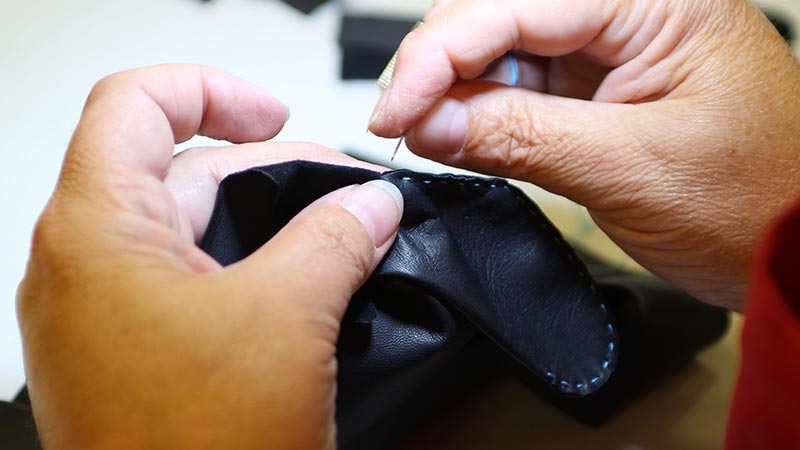
First, a trained selector must choose the right leather for the glove to be created, and check for flaws to make sure both gloves will match. Then, a card pattern is used to trace the glove onto the leather, preferably with the fingernail, so that impression will not be a lasting one.
Before the glove shape is cut out, the leather is soaked to make it more pliable when stretched. An expert glove cutter, using large shears, cuts the leather into an exact shape. Glove parts are then expertly hand sewn.
Glove linings are typically made of silk or cashmere. The lining is like a second pair of gloves and can take as much skill to make as the glove itself. After a lining is inserted, the glove is “laid out” or ironed on an electrically heated brass hand.
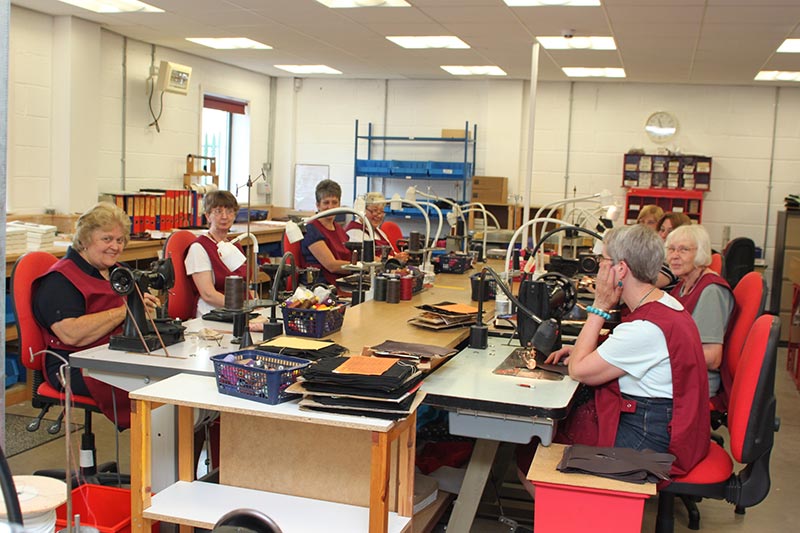
“Gloving gets into your blood,” Moore said, referring to the company’s loyal UK staff, who hand cut and hand sew the gloves, “many of whom have been here 20, 30, 50 years.”
QUOTES
“We would make a special glove for a coronation. We already make Prince Charles’ gloves.”
— Deborah Moore, chief executive, Dents
“Fifty percent of Dents sales are made in the UK. The rest . . . come from exports. We are shipping. . . to 27 different countries, mostly Europe. The Baltic countries in Eastern Europe are suddenly becoming more affluent. Our business in China is booming. . . . They have cold weather. They like the traditional, handsewn gloves with cashmere lining.”
— Deborah Moore, chief executive, Dents
“The biggest problem with Brexit is it gives us a weak pound. It made our skins more expensive.
— Deborah Moore, chief executive, Dents
“Retail online sales are growing at approximately 20 percent a year and now account for 35 percent of the business.”
— Deborah Moore, chief executive, Dents
STYLES
Naturally, Dents gloves appeal equally to both men and women — but for different reasons. Moore said, “The man is somebody interested in heritage brands. He wants to buy something that’s not just for today. It’s not an impulse purchase. With women, it’s much more about fashion. They’ll often buy a color — a coat and the hat and glove to go with it. It’s all about ‘for now.’ ”
The glovemakers produce about 200 to 300 different glove styles. “We have a team of six designers. We launch our new collection every January. New color combinations and a lot more browns are coming back. Brown has not been popular for the last few years. Suddenly, it’s browns and cognac. Burnt orange (in women’s gloves), are also popular — part of the brown spectrum,” she said.
Women can choose from different glove styles — casual, classic, driving, fashion and occasion. Gloves come unlined, or lined with cashmere, fur and silk — an elegant way to fend off finger-nipping cold.
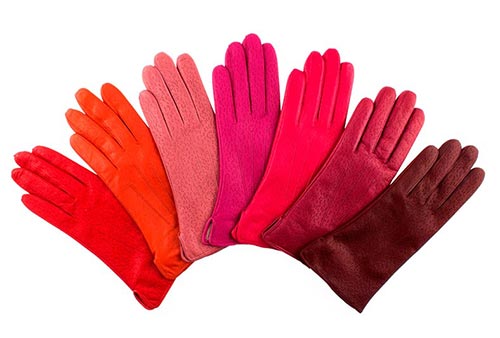
Imported accessories, designed by the Dents team, also include sheepskin mittens and fabric gloves made of cotton, cotton crochet, tulle, velvet, herringbone, knitted wool and satin used in evening gloves. Studded leather and silk-lined hairsheep leather gloves with fur cuffs, for instance, are part of their fashion line. The most popular, bestselling women’s glove? The plain, classic, cashmere-lined design.
For use with your smartphone and tablet, there’s the Touchscreen, a technology inspired glove, which eliminates the bother of taking off gloves in freezing weather to use a digital device.
“It’s nanotechnology,” Moore said, of the conductive material that impregnates the gloves. “Men use these gloves 10 times more than women. Men like gimmicks and technology. Touchscreen leather is not quite as soft as aniline leather,” she said, of leather dyed with soluble dyes.
Gents are also offered a variety of glove styles — casual, classic, driving and occasion — but not fashion, as with the women’s selection. Men’s gloves come unlined, or lined with cashmere, silk and lambswool, but not fur. “The handsewn leather glove with a cashmere lining and a strap on the palm, is popular with men. The design is more masculine in appearance,” she said.
Men’s glove colors are more subdued than women’s. But a few men’s glove styles, such as the classic hairsheep leather driving glove, are available in bright red (berry).
Not surprisingly, women’s gloves offer far more colorful options — black, charcoal (gray), navy, mocha, cognac, amethyst, azalea (deep pink), berry (red) and fennel (olive brown).
The most popular glove color? “Black, black and black,” Moore said.
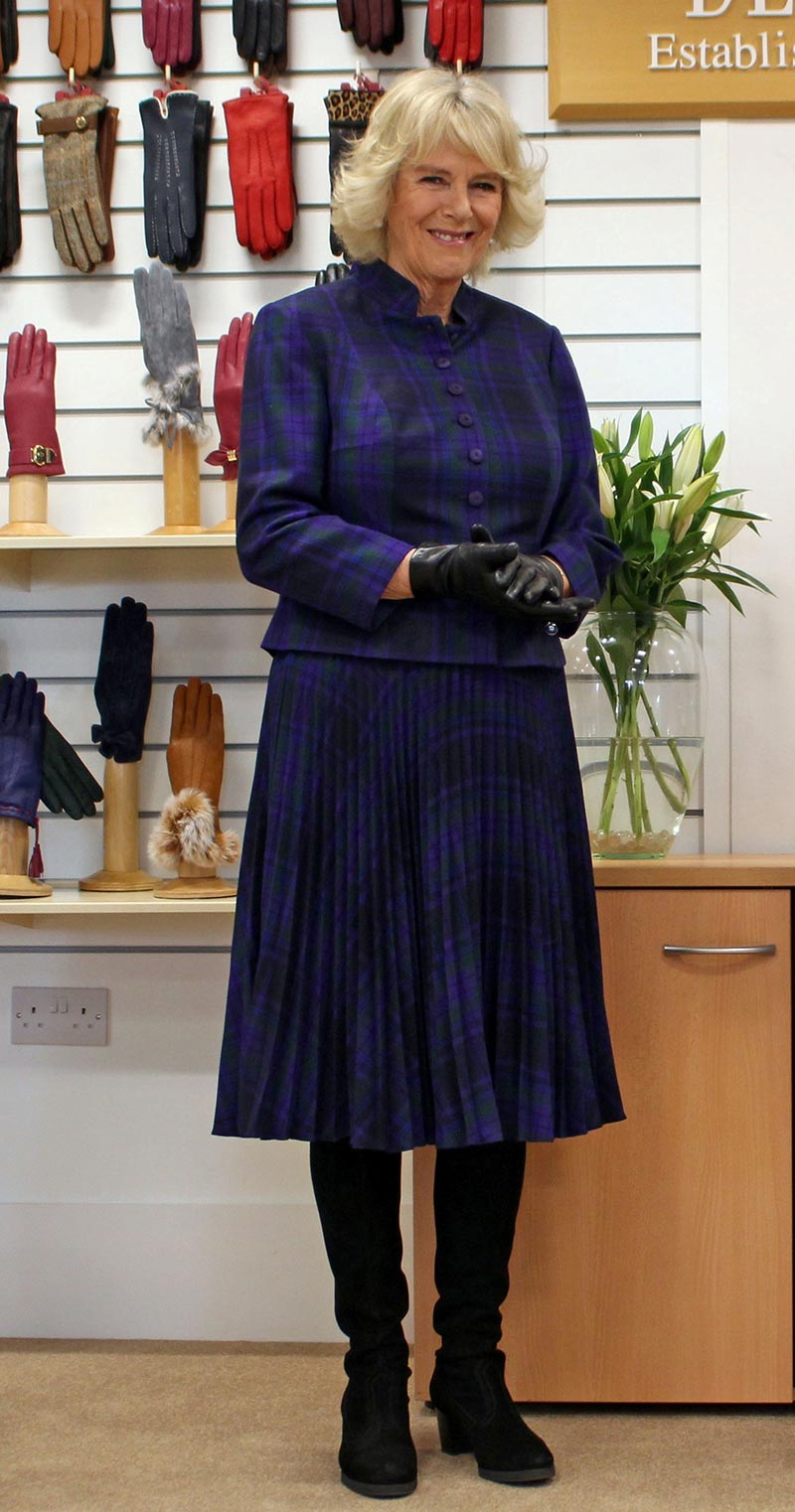
THE BOTTOM LINE
Approximately 800 pairs of Dents gloves are made per week in its UK facility, and about 2,000 pairs per week in the Czech Republic, Moore said.
Their signature, heritage glove accounts for about 30 percent of sales. Fifty percent comes from gloves made in the Czech Republic, and 20 percent from the sale of small leather goods, such as wallets, belts, cardholders, pen cases and lambswool scarves made in Scotland. Dents sells to about 600 to 800 stores, worldwide.
“We sell only to the finest stores,” she added, citing US retailers, like Saks Fifth Avenue, Neiman Marcus and J. Crew, and the luxury men’s clothing store Harry Rosen, based in Toronto, Ontario, Canada. High-end department stores in the UK, include Harrods, House of Fraser and of course, Selfridge’s & Co.
Fifty percent of Dents sales are made in the UK. The rest come from exports. “We are shipping everywhere — to 27 different countries, mostly Europe. The Baltic countries in Eastern Europe are suddenly becoming more affluent. Our business in China is booming — in places like Shanghai and Beijing — first-tier countries. They have cold weather. They like the traditional, handsewn gloves with cashmere lining,” she said.
Some other Dents markets are South Korea, Singapore, Hong Kong, France, Germany, Spain, Italy, Belgium, Latvia, Estonia and Australia. Their biggest export market, however, is Japan.
“We sell to the Japanese royal family and to fine stores there. We’ve been selling in Japan to the same distributor for over 60 years. In Japan, they have an old-fashioned distribution system. We sell to the distributor; they sell to the wholesaler, who sells to retail. We have Japanese turning up at the factory! We’re really famous in Japan.”
Visitors also come to tour the Dents Museum, based in the UK facility. The museum has one of the most extensive, privately-owned glove collections in the world, including gloves once worn by Elizabeth I, Sir Walter Raleigh and Queen Victoria. The museum is not open to the general public, but viewings can be arranged for small groups, according to the Dents website.
How has Brexit, the potential exit of the United Kingdom from the European Union, affected Dents’ bottom line? “The biggest problem with Brexit is that it gives us a weak pound. It made our skins more expensive,” Moore said.
According to the Dewhurst Dent director’s report and financial statement for the year ending Jan. 31, 2016, their annual turnover, or total sales, was $13,655,123, down from $14,412, 585 the previous year. Despite the loss, the business posted a profit for the year.
The report attributed the downturn to the previous mild winter, followed by yet another milder winter. Gloves are seasonal accessories, Moore pointed out, and weather can adversely affect sales. “We’re having warmer and warmer winters. We need a cold winter,” she complained, citing a drop in sales for their warm, wool-lined lambskin gloves.
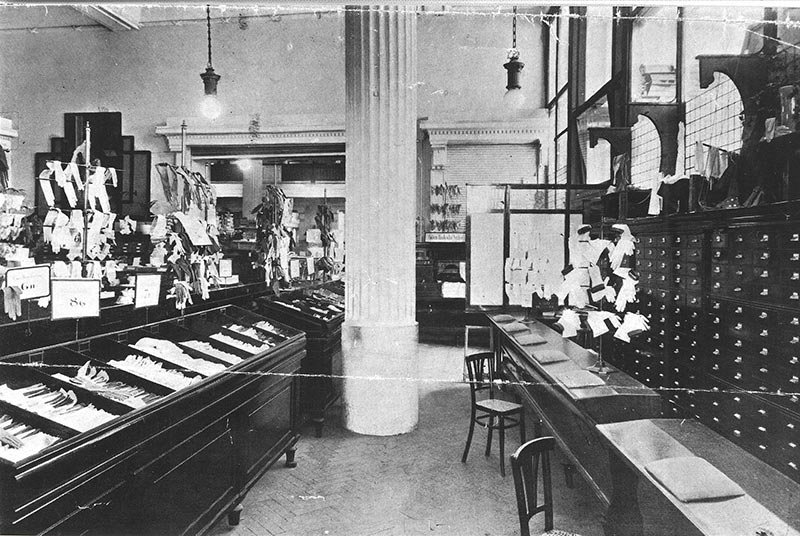
“Overall, business for the past three years has been OK, with moderate growth,” she said. “We have seen the decline of the small, independent retail store and an increase in online sales. Retail online sales are growing at approximately 20 percent a year and now account for 35 percent of the business.”
A big challenge looming on Dents’ horizon, is finding and training younger workers to replace those approaching retirement. “It’s very difficult to attract younger workers. They don’t want to stand at a cutting bench or sit at a sewing machine. We have a family atmosphere here. The staff doing piecework is interested in getting a quality product, at the end of the day. They are hard to replace.”
How does Dents keep their traditional glove business thriving, given today’s fast-moving fashion trends and a highly-competitive, global economy?
“Being multichannel is keeping us profitable in an industry that is contracting,” Moore explained, citing Dents’ export customers, department store business, online shops, small, specialist retailers and their retail shops, or concessions, set up within department stores like Selfridge’s and the US-based Dillard’s.
“In a global marketplace, you have to be light on your feet and move quickly, try anything and see if it works. If it’s not, try something else. It’s also important to keep up with the ever-changing technology,” she said.
LEATHERS USED IN DENTS GLOVE MAKING
- Hairsheep — A soft and strong, but not bulky, top-grade leather, from a breed of sheep that grows long hair, not wool. Sourced from Ethiopia and Nigeria, its natural elasticity makes it ideal for dress gloves. Pittards, a premier tannery in Yeovil, England, has been supplying hairsheep for Dents for more than 100 years, according to www.glovesonhand.co.uk
- Deerskin — Dents sources this supple, durable and grainy leather, typically used for men’s gloves, from Johnstown, upstate New York, USA, where tanneries still operate, but not glovemakers, Dent’s CEO Deborah Moore, said. From 1890 to 1950, the neighboring town of Gloversville was home to numerous tanneries and glovemakers. In fact, 90 percent of all gloves sold in the United States once were made in Gloversville, employing nearly 80 percent of its local residents.
- Peccary — A supple, durable, luxurious leather with a textured feel. “We’re paying about $15 per square foot. It’s very expensive, and it comes from a wild pig in South America. They’re protected, and you need a CITES (Convention on International Trade in Endangered Species) permit to ship it. Not many people make gloves from peccary. These gloves sell from $300 to $400 per pair. There’s a big market for them in Japan,” Moore said.
Since the peccary is a wild animal, its skins can have as much as 50 percent waste, she noted. Peccary is a particularly finicky leather to work with, requiring a master glove cutter and a handsewer with special skill and dexterity. - Carpincho — A leather derived from the capybara, a semi-aquatic rodent native to South America. It has a suede effect and looks similar to peccary; only it is less durable and soft and is less expensive. Only a very small number of Dents gloves are made with this leather, Moore said.
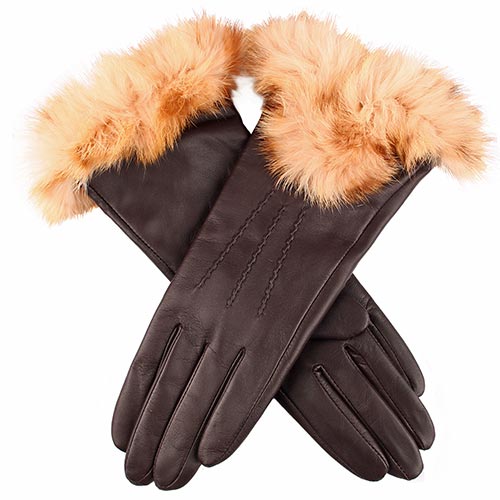
DENTS GLOVES PLAY SUPPORTING ROLES IN TV AND FILM
Fashions are fickle. And fine gloves, like other accessories, are subject to the passing whims of style. “It used to be a custom, a formality,” said Deborah Moore, CEO at Dents, a glove manufacturer with long historic roots in the UK. She was referring to the era when properly civilized souls deemed it necessary to don the right dress glove with the right apparel.
The late 1950s, however, marked the last heyday of formal glove wearing, glove wardrobes and glove etiquette. In 1961, Audrey Hepburn briefly popularized the long white glove in the movie classic, Breakfast at Tiffany’s. But by the mid-1960’s, casual attire took over.
Glovers in the UK became an endangered species. At one time, more than 100 UK glove companies were in business in Worcester alone; today, only three or four glovers are left in the entire country, according to Moore. Yet, the luxury glove is not a lost relic of social consciousness. Recent years have seen an encouraging upswing in luxury glove popularity, she said.
“Gloves work well with women’s boxy handbags and suits, and for men, go great with a nicely tailored jacket or overcoat. One of the big fashion trends is the driving glove,” she added, a design created during the era of the unheated motorcar. A lighter, open-backed leather driving glove, which grew popular after cars were heated, remains trendy today, an article to keep safe in the “glove compartment,” a term still part of our automotive lexicon today.
Moreover, a renewed interest in traditional, classic apparel has been sparked by the tremendous appeal of British-produced, period dramas. A prime example is Downton Abbey, a smash-hit, TV series that lavishly features post-Edwardian, upper-crust fashions — and yes — Dents gloves.
Their genuinely-styled period gloves and hats helped to bestow an aura of authenticity upon certain scenes, say, during those formal evening occasions when top-billed actresses donned elegant gowns and long satin gloves.
For those smitten by the series, Dents offers, among other period-style accessories, a Lady Mary Crawley style, wool-lined, leather glove with rabbit fur trimmed cuff and covered buttons detail, ($99).
Also available from Dents, a pair of ultra-soft, red leather buttoned gloves with full silk lining, a best-seller ($99), prominently featured in the TV drama, Mr. Selfridge. The series centers on retail magnate, Harry Gordon Selfridge (Jeremy Piven) and his early 1900’s, high-end, London-based department store Selfridge & Co. In fact, an extensive line of Dents gloves and accessories are still sold at the iconic store. (http://www.selfridges.com/GB/en/cat/dents )
Other celebs have worn Dents gloves as well: At the 2015 Oscars, Lady Gaga flaunted a sartorially controversial pair of wide-cuffed, bright-red leather gloves.
Also, unlined, black hairsheep leather gloves, the style worn by actor Daniel Craig in his James Bond role in Skyfall (2012), are promoted at the Dents website as the “James Bond Spectre Skyfall,” for men who’d like to “unleash” their “inner, secret agent.”
Once again, Dents is contributing to the accuracy and authenticity of period costuming in Goodbye, Christopher Robin, a recently released film that gives a poignant glimpse into the not-so-idyllic relationship between Winnie the Pooh author A.A. Milne and his son, Christopher Robin.
Oh, and did we mention that Dents gloves also play a small, but distinctive supporting role in the current remake of Murder on the Orient Express, starring David Branagh as detective Hercule Poirot. (Today’s romantic travelers can ride on the privately-owned version of that iconic train, the Venice-Simplon-Orient Express.) — Lynn Ascrizzi
INFO BOX - LEATHER GLOVE CARE TIPS
The Dents website offers some gentle, leather glove care suggestions. Here’s a summary:
- Allow wet gloves to dry naturally, away from heat sources such as radiators, hair dryers or the sun.
- For heavily soiled gloves: Use a professional, leather dry cleaner.
- For light soiling: First prepare a hot-to-the-hand solution of soft soap flakes. Then, gently sponge the glove’s outside leather with the solution. Try not to saturate the leather. Dab off excess wetness with a clean, dry cloth. Let the gloves dry naturally, without external heat. As they dry, the wearer should put them on their hands, momentarily, to help stretch the leather and restore their shape.
- If you use a commercial leather cleaner or conditioner, please read product instructions carefully, and be sure it’s suitable for your glove leather.
An added note: Dents’ chief executive, Deborah Moore, does not necessarily recommend cleaning Dents gloves. “Leather is like a skin. It almost cleans itself. It looks after itself,” she said.
CONTACTS
Dents is a division of:
Dewhurst Dent, PLC
Union Mill,
Vernon Street
Bolton BL1 2PT, UK
Deborah Moore, chief executive
Phone: 011 44 1985 211927
dmoore@dents.co.uk
Sally Smith, media office manager
Phone: 011 44 1935 842094
sally@tradewindspr.co.uk
For more information on Dents’ accessories:
Custom Services Manager
Furnax Lane
Warminster, Wiltshire BA128PE, UK
Phone: 011 44 1985 212291
Fax: 011 44 1985 216435
dents@dents.co.uk
sales@dents.co.uk
www.dents.co.uk
This article is originally published on www.shoptalk-magazine.com and re-published here with permission.






